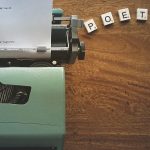Poet laureate is a title given to a renowned poet who is expected to provide verses about national events and raise the nation’s awareness of poetry.
Many countries appoint a regular poet laureate under different names, but England was the first in the 17th century. The position is versatile depending on the person holding it at the time, so the works of the laureate vary; however, they have all contributed to the preservation of the art form greatly.
Since the post became royally established in 1668, the U.K has had 28 poet laureates. We’ve put together some information about the position and the people who have held it since Charles II officially introduced it to help you better understand the importance of the post.
What is a poet laureate?
A poet laureate is a poet chosen by a monarch or government to create poems about the national affairs, events, and occasions of their country.
Although it’s no longer an official requirement, many laureates continue to do so in reaction to the country’s affairs. Poet laureates also often set up awards, foundations, and archives to support the future of poetry and its authors. Part of their position is also to encourage the public’s interest in the reading, writing and importance of the art form. Until 1999, the poet laureate remained in the position until their death however, each representative now holds the position for ten years to allow more diversity.
Timeline of past poet laureates
The role of the poet laureate was officially introduced by Charles II in 1668. Despite this, others were assigned the same duties and received a pension for them before that date, but because these people weren’t officially appointed we haven’t included them in our timeline.
Here are the official poet laureates as appointed by the King or Queen at the time
Click here to skip to the text version of this timeline.

John Dryden (1668 – 1689)
Most well known for writing elegies, odes and prologues, Dryden was a poet, satirist and translator. He was most prominent in Restoration England, which is commonly referred to as the Age of Dryden.
Thomas Shadwell (1689 – 1692)
Shadwell was a poet and playwright, though more established as the latter. Despite his work, he is best remembered for being satirized by previous poet laureate John Dryden after a political dispute
Nahum Tate (1692-1715)
This Irish poet, hymnist and lyricist is remembered for his adaptation of Shakespeare’s King Lear. Also credited to his name is Christmas carol While Shepherds Watched Their Flocks and the poem Panacea: A Poem Upon Tea, both written during his tenure as poet laureate.
Nicholas Rowe (1715 – 1718)
Poet, dramatist, writer and translator Nicholas Rowe is considered the first editor of Shakespeare’s work, which he gained access to through his laureateship. He also translated Roman poet Lucan, which has been described as one of the greatest productions in English poetry
Laurence Eusden (1718-1739)
Eusden remains the youngest poet laureate at 30. He was appointed due to a poem he wrote for the 1st Duke of Newcastle’s wedding. Eusden produced regular royal birthday and new year odes for his whole laureate tenure, though his work is extremely hard to find nowadays.
Colley Cibber (1730 – 1757)
Believed to have been appointed due to his political views, Cibber was primarily an actor-manager. His widely remembered laureate contributions are his 30th birthday poems for the royal family, which were met with scorn from his literary peers.
William Whitehead (1757-1785)
One of the more conscientious laureates, Whitehead was appointed after pre Romantic poet, Thomas Grey, declined the position. He avoided flattery or politics in his laureate writing and considered himself a non-partisan representative of England.
Thomas Warton(1785- 1790)
Warton was a literary historian and critic as well as a pioneer among the Graveyard poets. His work was melancholy and reflected on human mortality and gothic imagery. Most of his best known work was produced before he was 21, most notably The Pleasure of Melancholy.
Henry James Pye (1790 – 1813)
Pye was a prolific prose writer, though his poetry is mostly forgotten now and wasn’t received well in the 18th century. Suspected to have been appointed due to political favours, Pye was also a member of parliament, and was the first Laureate to get an actual salary – previously they were paid in wine.
Robert Southey (1813 – 1843)
A poet of the Romantic era, Southey was considered a Lake poet’, meaning his work was inspired by the Lake District. His most famous poem is the anti-war poem After Blenheim, and he also wrote the fairy tale Goldilocks and the Three Bears.
William Wordsworth (1843-1850)
An infamous poet, Wordsworth pioneered the Romantic era with his joint publication of Lyrical Balls with Samuel Tylor Coleridge. He initially refused the position until the Prime Minister told him nothing would be required of him, resulting in him being the only laureate to write no official verses.
Alfred, Lord Tennyson (1850 – 1892)
One of the most celebrated British poets to this day, Alfred, Lord Tennyson was the author of infamous Crimean war poem ‘The Charge of the Light Brigade’ and ‘In Memoria A.H.H’, written in memory of Prince Albert. Many of Tennyson’s written phrases are still quoted today, and he remains the longest serving poet laureate.
Alfred Austin (1896-1913)
Austin wasn’t appointed until four years after Tennyson’s death, partly out of respect but also because other candidates refused the offer. His literary peers dubbed him a ‘Banjo Byron’ and most of his work isn’t remembered today, though it was very supportive of the government at the time.
Robert Bridges (1913 – 1930)
Bridges was a doctor as well as a poet and lyricist, whose writings were made up of very strong Christian themes. He wrote many well-known hymns and, though his poetry is mostly forgotten, his verses were revered by British composers at the time and is acknowledged today for his contributions to modem hymnody.
John Masefield (1930 – 1967)
The first laureate to introduce an award for poetry, Mosefield created the annual rewarding of the Royal Medals for Poetry, which is awarded to a first or second published edition of poems by a poet under 35. He took his role very seriously, producing large quantities of poetry for royal and national occasions, and he was also a children’s author.
Cecil Day-Lewis (1968-1972)
Day-Lewis became the vice president of the Royal Society for Literature during his tenure as laureate, and wrote many poems for the royal family. These include ‘Birthday Song For A Royal Child’ for the birth of Prince Andrew and ‘For The Investiture of the Prince of Wales’ for Prince Charles
Sir John Betjeman (1972 – 1984)
Still a celebrated figure in Britain today due to his TV and radio appearances, Betjeman was a poet, writer, broadcaster and journalist. His poetry contained many nostalgic themes, which proved popular with his audience as he preserved a declining culture in his words.
Ted Hughes (1984 – 1998)
Ranked as number four on The Times ’50 Greatest British Writers Since 1945), Hughes poetry during his laureateship wasn’t well received due to its unwavering patriotism and poor style. Despite this, he was awarded the Order of Merit, one of the highest honours in Britain
Andrew Motion (1999-2009)
Motion would only take the post if it was limited to ten years rather than the rest of his life, which was how long previous laureates held the position, and this is now standard of the role. He founded the poetry archive during his laureateship, which is an online collection of poems and recordings for anyone to access, and was determined to write about ordinary things, including homelessness, liberty, bullying and the Twin Tower attacks.
Carol Ann-Duffy (2009-2019)
Duffy was the first female, first Scottish-born and first recognised LGBT+ poet laureate, and took inspiration from Andrew Motion. Not only did she write about royal arrangements, including the anniversary of the Queen’s coronation and the wedding of Prince William and Kate Middleton, but she also tackled subjects like climate change, species extinction and the war in Afghanistan
Simon Armitage (2019-)
As Britain’s current poet laureate, Armitage has written about things like Mental Health Awareness Week, the Coronavirus pandemic, the death of Prince Philip and the anniversary of the death of famous poet John Keats. Armitage plans on touring as many libraries as possible to give readings and wants to incorporate poetry into other media so the art form can gain more recognition in a digitally evolving world.
How to become a poet laureate
The reigning monarch awards the poet laureate position to a poet of national significance, with a body of renowned work and a strong understanding of its creation. No one can apply for the role – on the advice of a range of people from different literary and arts organisations, the government chooses a gifted poet for the post.
If you would like to develop your own body of renowned work, poetry or otherwise, we have some brilliant writing courses that will help you. They will greatly improve your writing skills and give you the inspiration to nurture your talent and confidence in your abilities – and potentially get you that step closer to poet laureate!
Although the UK has only one royally appointed laureate, there are many themed laureates up and down the country. From the children’s laureate, the canal laureate and the Scottish makar – there are poetry representatives all over the country. They all play a part in preserving poetry and its importance for this and future generations. Their continued efforts, including an online archive, multiple awards and endless verses celebrating points in Britain’s history, serve as a reminder that poetry is a beautiful form of expression that helps people connect with one another, something we all need in these times.








